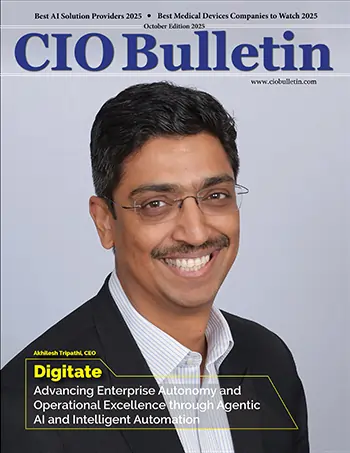Best 30 Companies of the year 2018
Cio Bulletin

With the rise of artificial intelligence and machine learning, many organizations are putting these technologies into practical use and making it a reality. What makes machine learning so important is its iterative aspect. It is because of this that the AI and ML models are exposed to new data and they are able to independently adapt.
Petuum brings with it a platform that is embedded with software infrastructure and ecosystem that enables AI for enterprises. The operating system by Petuum gives users a single platform to build any Machine Learning or Deep Learning application. Users can simply use large amounts of data and easily deploy it at scale on any hardware. It can be anything like workstations, datacenters or even the internet of things, edge computing and many more.
Dr. Eric P. Xing, the founder, CEO, and chief scientist of Petuum explains the workings of the company, “The Petuum development platform and gallery of AI building blocks work with any programming language and any type of data, allowing managers and analysts to quickly build AI applications without any coding, while engineers and coders can further re-program applications as needed.â€
Support for the AI Platform
When it comes to applications and hardware with artificial intelligence, Petuum creates and manages everything from a single laptop or terminal. It drives higher productivity, better service, lower costs, and faster delivery. Petuum has successfully lowered the barriers to AI adoption by standardizing its AI solutions. Through this, the company has allowed the smooth integration of AI into every industry.
Interestingly, Petuum has become one of the highest funded early-stage Artificial Intelligence and Machine Learning startups. It closed a Series B round investment for $93 million that was led by SoftBank along with participation from previous investor Advantech Capital.
AI and ML Products
The best of Petuum is that it transforms the entire process of creating AI and ML solutions. While the process might have been slow, expensive, unrepeatable and hard, Petuum transforms it into a craftsmanship of fast, affordable, repeatable, transportable and standardized industrial production.
For one, the Petuum Operating System (PetuumOS) has provided the software fabric beneath enterprise-scale AI solutions. This has in turn, allowed clients to take maximum advantage of both general-purpose and customized hardware infrastructures. They can even spread it across different computing paradigms, such as distributed computer clusters and networks of embedded devices.
With PetuumOS, mounting and using existing AI and ML programs are as simple as drag-and-play actions via a graphical user interface. When it comes to building new programs on various computing infrastructures such as a data centers, GPU clusters, or IoT systems, Petuum makes it as easy as standard programming on a universal virtual machine using popular existing programming languages.
Petuum’s Poseidon
 Apart from the PetuumOS, Petuum has another star solution called the Petuum Poseidon. This solution is a specialized framework that is powered by PetuumOS. Poseidon supports highly efficient deep learning computing and programming built on general-purpose or customized hardware infrastructures across different computing paradigms.
Additionally, Poseidon allows users to build new machine learning and deep learning models with cutting-edge designs that cannot be easily produced in other development languages. Poseidon also allows users to run and manage existing deep learning programs written for popular software or to create new ML and DL models.
Petuum uses various development languages such as TensorFlow, Caffe, and DyNet. DyNet is Petuum’s preferred DL language that natively supports the newest generation of dynamic DL models for natural language processing and video analysis.
Healthcare Solutions by Petuum
Petuum has also developed solutions for the healthcare field. The healthcare software system is called PetuumMed and caters to end-to-end artificial intelligence functions needed in healthcare applications. The platform can easily turn electronic medical records including medical notes, images, vitals, lab tests, genomic data, etc, into meaningful information sources for computational clinical support.
Additionally, PetuumMed also offers medical practitioners second opinions for disease diagnosis and possible treatment recommendations. “Our program helps improve the productivity of medical practitioners, by accurately extracting symptoms, diseases, drugs, and other key terms from the medical notes to aid the clinical workflows,†explains Dr. Xing.
And that’s not all. The PetuumMed is also very capable of effectively generating diagnoses from medical images such as chest x-rays to help detect diseases such as tuberculosis. It works with complete accuracy that can even be compared to a trained medical professional by offering a prompt second medical opinion.
Meet the Inspirer
Dr. Eric P. Xing is Founder, CEO and Chief Scientist at Petuum Inc. He is a Professor in the School of Computer Science at Carnegie Mellon University. He is also the Associate Department Head for Research of the Machine Learning Department and the Founding Director of the Center for Machine Learning and Health at CMU. For his distinguished contributions in AI/ML, he was elected a Fellow of the Association for the Advancement of Artificial Intelligence (AAAI).
Dr. Xing is a thought and innovation leader in Machine Learning and Artificial intelligence. He is a board member of the International Machine Learning Society, program chair and general chair of the International Conference of Machine Learning, and a member of the U.S. Department of Defense Advanced Research Projects Agency (DARPA) Information Science and Technology (ISAT) Advisory group. He is the recipient of numerous awards including The National Science Foundation (NSF) Career Award; Alfred P. Sloan Research Fellowship in Computer Science; the United States Air Force Office of Scientific Research Young Investigator Award; and the IBM Open Collaborative Research Faculty Award.
“With our technical strength, we solve problems at the forefront of machine learning, distributed systems, and human-computer interaction.â€







